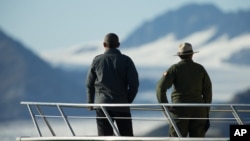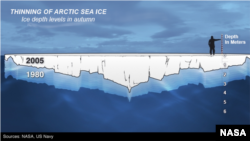President Barack Obama used the backdrop of a rapidly melting Alaskan glacier to highlight the effects of climate change, as he continued his landmark visit to the far northwest state.
"This is as good a sign post of what we are dealing with, when it comes to climate change, than anything," said Obama, standing in front of the Exit Glacier, which has receded two kilometers over the last two centuries.
Climate change has resulted in winters with less snow and hotter summers, melting polar ice and raising sea levels, Obama said. "It sends a message about the urgency we are going to need to have when it comes to dealing with this," he added.
President Obama's highly choreographed, three-day trip across Alaska aims to build support for his environmental policies to combat climate change. He is the first sitting U.S. president to visit the Arctic Circle.
Scenic tour
On Tuesday, Obama took a scenic boat tour in Resurrection Bay in Alaska's Kenai Peninsula. He also filmed a segment with reality TV host and survivalist Bear Grylls.
His trip has not only highlighted concerns over global warming, security and energy, but also issues of shipping, mineral exploration and fishing. All are intertwined, and each is of vital global interest.
International rules covering the preservation and development of this region have yet to be established, however, and likely will take center stage in the coming months.
Obama is urging the U.S. Congress to approve a faster track for building a new heavy icebreaker, moving its completion date from 2022 to 2020.
With melting ice in the Arctic, the need for the new vessel might seem contradictory. But as the Arctic waters become more accessible for trade routes and drilling for oil and natural gas, far more ship traffic could be at risk, with shifting climate conditions leading to unpredictable freezing seas. The Arctic seabed may hold nearly a quarter of the world's untapped oil and gas.
The heavy icebreakers are costly, with a $1 billion price tag. But the U.S. is down to just two of them, falling far behind Russia, which has 40.
Growing discussion
Michael O'Hanlon, senior fellow at The Brookings Institution and a national security expert, said there has been a growing discussion about this subject.
"Whether we are essentially ceding the Arctic to Russia, and exactly what that means, of course, can be debated. What it boils down to is that if something is within 200 miles (320 kilometers) of your coastline, it's yours for economic purposes," he said. "You also can debate whether something is yours if it's beyond that — should it be seen as part of the logical geographical continuation of the continental shelf? And I believe Russia is trying to involve that for some of its claims right now."
Heather Conley, director of the Europe Program at the Washington-based Center for Strategic and International Studies, said "we desperately need a forum to discuss these emerging security issues."
"Looking at the overarching response we are seeing of Russia’s approach to the Arctic, I would say we are looking at an emerging picture of anti-access and area denial, and that is a very different message than we had seen even 12 to 16 months ago.”
'Threat of the century'
As he began his visit to Alaska Monday, President Obama declared climate change to be the defining threat of this century.
At a State Department-sponsored summit on Arctic environmental issues, he said the world is "not acting fast enough" to address climate change.
"On this issue of all issues, there is such a thing as being too late,'' Obama said. "And that moment is almost upon us."
"Human activity is disrupting the climate, in many ways, faster than we previously thought. The science is stark. It is sharpening. It proves that this once distance threat is now very much in the present," he added.
Earlier, ministers from 11 countries and the European Union reaffirmed a commitment to take "urgent" action to slow the pace of global warming in the sensitive Arctic region.
Officials from the U.S., France, South Korea, Singapore and other countries announced their pledge in a joint statement, at the so-called GLACIER Conference.
William Gallo and Pam Dockins contributed to this report.







